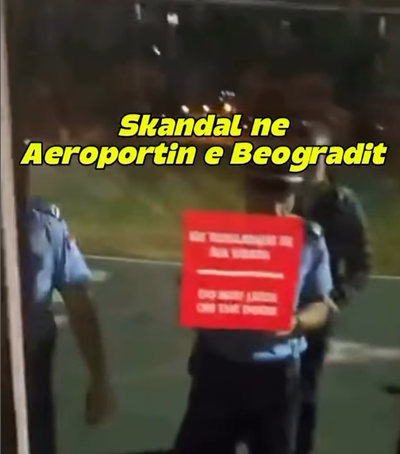
Today, the Minister of Health, Ogerta Manastirliu, signed the order and security protocols for the opening of nurseries and kindergartens on June 1.
The decision of the expert table stipulates strict security protocols, which must be implemented by the heads of kindergartens and nurseries, parents, educators and internal staff of these institutions.
Parents will not be allowed to enter the indoor environment, and they must report whether or not the children have had a fever at home.
As young children, the temperature will be measured as soon as they arrive in daycare or in the nursery.
In any case of concern or increase in temperature, parents should show up to pick up the children at home.
- Parents should bring and receive children with strict observance of the set schedule.
- The child is accompanied by one parent, who stays outside the premises of the institution and waits at a distance of 1.5 m from the other parents to deliver the child to the kindergarten / kindergarten staff.
- Always the child is expected and accompanied within the institution by an educator who takes the child to the entrance of the kindergarten.
- The head of the institution must appoint a person who, at the moment when the child enters the institution, performs every day:
- Temperature measurement with digital thermometer.
- Cleaning the child's hands with the hygienic solution at the moment he enters the nursery / kindergarten ", emphasizes the security protocol.
FOR "MEASURES BY COVID-19 WHICH SHOULD HAVE CHANGED INSTITUTIONS OF GARDENS AND CARDS"
FOR CHILDREN AND CHURCH CHILDREN
A - Bringing and receiving children from the institution (nursery, kindergarten)
- The schedule for bringing and receiving children in these institutions is regulated according to a schedule drafted by the institution and monitored by the educators.
- At the entrance and exit of the institution, a hand sanitizer should be placed in the form of a solution with an active alcohol content of 60%, which should be present at all times, so that children clean their hands when they come and when they leave.
- Parents should bring and receive children with strict observance of the set schedule.
- The child is accompanied by one parent, who stays outside the premises of the institution and waits at a distance of 1.5 m from the other parents to deliver the child to the kindergarten / kindergarten staff.
- Always the child is expected and accompanied within the institution by an educator who takes the child to the entrance of the kindergarten.
- The head of the institution must appoint a person who, at the moment when the child enters the institution, performs every day:
- Temperature measurement with digital thermometer.
- Cleaning the child's hands with the hygienic solution as soon as he enters the nursery / kindergarten.
- If possible, place bathtubs with disinfectant solution based on active chlorine, to disinfect shoe extinguishers before entering the indoor environment of the nursery / kindergarten.
- The child is allowed to enter and leave the institution only on arrival and departure.
- It is recommended that the behavior or taking of children from kindergarten be done by the parent and not by the grandparents.
- The door of the institution will remain closed while the children are inside, while
the windows of the halls are opened from time to time to allow the necessary ventilation within them. The environment must be well ventilated at all times.
- In case the child develops a fever, the parent should immediately inform the educator and keep the child at home.
- If the child develops a fever or other signs of poor health, the parent is notified to appear to pick up the child as soon as possible from the kindergarten / nursery premises.
B - Social distancing strategies while staying in the kindergarten
- It is recommended to maximize the use of the premises of the institution, to maintain physical distance in groups with a large number of children.
- The children of a group should stay in the same room / room every day and with the same educator.
- It is recommended not to perform any activity outside the garden.
- During the learning process, educators stay respectful of the distance and it is recommended to try to place the children at a distance from each other (eg around a table with 10 chairs sit 5 children).
- Take the necessary measures so that children do not help spread the virus transmission by:
- Keep each group of children in a separate room / hall.
- Limit the mixing of children between groups, at the time they perform activities such as games in the yard, designing a graph by group for these activities.
- Games with each other, or other activities, should be organized so that physical distance between children is always respected within the possibilities.
- At bedtime, make the most of the room space by placing the children away from each other.
- It is recommended not to organize children's birthday parties in the kindergarten.
Care in the kindergarten / nursery environment
A - Hygiene care
- Children should be aware of the importance of physical distancing and personal hygiene in the premises inside and outside the institution, through messages given by the educator.
- Children should be constantly talked about COVID-19, hygiene rules, hand washing, proper way of coughing and sneezing.
- To place special posters for the way of hand washing.
- Posters on COVID-19 infection prevention measures, respiratory and personal hygiene as well as the rules for physical distancing, designed in the simplest and most understandable way by children, should be posted on the premises of the institution.
- Every child should be encouraged to wash their hands after any action that may pose a risk of spreading the virus: touching the nose, eyes, mouth, etc.
- Must be provided: running water, liquid soap, paper for wiping hands and gel with alcohol content 60%, in the premises of the institution.
- To disinfect every room, every day. After removing the children, clean the surfaces and furniture with disinfectants.
- At the end of each day, the disinfection of the common areas must be performed.
Toy cleaning and disinfection
- Toys that cannot be disinfected should not be used.
- Toys or objects that are put in the mouth and that are contaminated with secretions should be removed and not used until they are disinfected.
- Toy clothes that can be washed in the laundry should be used only by one child and then washed, before being used by another child.
- Toys or didactic tools should not be passed from one group (class) to another without first washing or disinfecting them.
- Children's books, as well as other paper-based materials, such as paper, envelopes, magazines, files, are not considered to pose a high risk for transmission and do not require additional cleaning or disinfection procedures. Care for infants and young children
- Changing the pampers
- When changing a child, first wash your hands, then use gloves to continue changing.
B - For Educators
- The medical staff of the institution or the staff of the institution appointed by the director and trained for the following actions, performs for each child the following procedure:
- Measures the temperature with a digital thermometer for all children as well as for all kindergarten / nursery staff.
- Spray disinfectant with alcohol content 60% in the hands of children and staff.
- Notes the health condition of children as well as the maintenance of hygienic-sanitary measures by them.
- While the educator stays with the children, she should try to respect the social distancing by orienting them to the places where they should stay.
C - For support staff
- The head of the institution should draft a schedule with schedules for cleaning and disinfection of the institution.
- It is recommended to routinely clean surfaces and objects that are most often touched by children, especially toys, chairs, tables, toy boxes, etc.
- Cleaning of these facilities should not be performed in the presence of children in the room / environment.
- Corridors and toilets are cleaned and disinfected regularly according to a schedule.
- Sanitary ware to keep the mask, gloves on during working hours.
- Departure from the institution is done after the completion of cleaning and disinfection of any of its premises.
- All tasks are performed respecting the social distance with children and educators and staff.
Food preparation and service
A - Kitchen workers
- Staff preparing food should always wear a mask.
- Personnel should always wash their hands before, during and after food preparation.
- Tools and surfaces used for food preparation should be washed before and after use.
- Washbasins used for washing and preparing food should not be used for anything else.
- The environment where child nutrition is performed must be cleaned and disinfected before and after eating by each group of children.
- Educators should ensure that children always wash their hands before and after eating, or clean them from time to time (for nursery children).
- Educators should always wash their hands before preparing food and after helping children to eat.
FOR PARENTS
- Signs or confirms electronically, to the educator, this regulation.
- Completes the daily self-declaration form with responsibility for the child's health condition in the contact number of the educator.
- In case of need for communication with the educator or manager, only electronic communication is used.
- In cases of accompanying the child in the institution, the parent should not enter the internal premises for any reason.
- The parent must declare whether he has had contact with persons affected by COVID-19 in the family or in the workplace.
- If the child has a fever or other symptoms of poor health, the parent should show up immediately to pick up the child.
FOR RIGHTS
- Provide staff equipment with protective equipment, such as: masks, gloves, disinfectant solutions.
- For every child who presents health problems such as fever, ascertained in the premises of the institution or notified by the parent, there has been contact with someone affected by
COVID-19, as well as if the respective parent is ill, or has had contact with persons affected by COVID-19, the manager immediately notifies the Local Health Care Unit
(NJ.KSH) and the relevant structure for this unit.
- For any educator or other staff of the institution, who presents health problems, such as. increase in temperature, etc., or there is a notification that there has been contact with someone affected by COVID19, the manager immediately notifies the Local Health Care Unit (NKVKSH) and the relevant structure in this unit.
Note: This guide may change depending on the needs directly related to the change in the epidemiological situation in the country.





